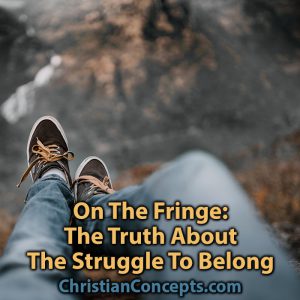Reading time: 3 minutes
Confidence is the antidote to rejection. It’s easy to think that confidence is only something other people can have. But you can have it too. The secret to confidence is to stop trying to be something you’re not.
Living with the excruciating pain of rejection is hard. Some people would rather be physically beaten than be emotionally beaten.
Does anyone in the world like you? Does anyone want to spend time getting to know you? Does anyone appreciate you? Does God? If you answer these questions “no” then you are living with the oppressive feeling of rejection.
Rejection, though it feels real, is more of an illusion than a reality, if you know Jesus. God knew you before you were born. Jesus redeemed you from all sin that separated you from God. God accepts you exactly as you are.
But this doesn’t mean you won’t struggle with rejection. You have experienced some rejection and you’ll experience some more. To gain confidence, you must learn to not care about the rejection that others direct your way.
Rejection can easily become a downward spiral. None of us knows who we are as much as God knows who we are. The more you’ve experienced rejection, the more you’ve probably gone into hiding. The more you are in hiding, the more people are rejecting the false you (because you are keeping the real you out of sight). But it will still feel like people are rejecting the real you, so you end up hurting more and hiding more.
There is no good reason for anyone to reject the best parts of you that come from God. Therefore, rejection has to do with being misunderstood rather than being defective. I would guess people with obvious disabilities experience this all the time in a much more direct way. How frustrating it is to be judged superficially. How frustrating to be judged instantly and only based on your performance in one moment rather than your potential.
How much have you become your own worst enemy? If you struggle with rejection, you struggle to understand who you really are. If you’ve stopped wanting to know the real you, it will be difficult for others to see you (as in “I see you” from the movie Avatar).
God sees your potential. Your potential comes from your heart, from who God made you to be. He sees you at your best even when you look your worst. You have the best qualities that God placed in you.
But the Lord said to Samuel, “Don’t judge by his appearance or height, for I have rejected him. The Lord doesn’t see things the way you see them. People judge by outward appearance, but the Lord looks at the heart.”
1 Samuel 16:7 NLT
If you struggle with low self-worth, you might be quick to focus on the negative part of this verse. You might be thinking, “But God rejected Eliab, so that means He most likely rejects me.”
God has the right to choose whoever He wants for what He wants to accomplish. God can’t make everybody king. Just because you are rejected for one thing, doesn’t mean you are completely rejected. God will reject you for everything He doesn’t have planned for your life. But this also means He accepts you for all the good things He has planned.
So don’t worry so much about rejection. You’ll probably be rejected 99 times out of a 100. But it’s that 1 out of 100 that matters. You only need 1. Cling to the truth that God accepts you as you are, for the purposes He has for you. Ask God to help you understand your purpose and forget about what He hasn’t chosen you for.
Image by Ulrike Leone from Pixabay






